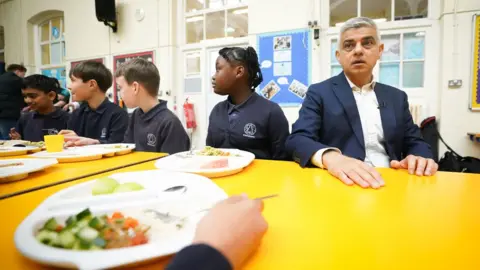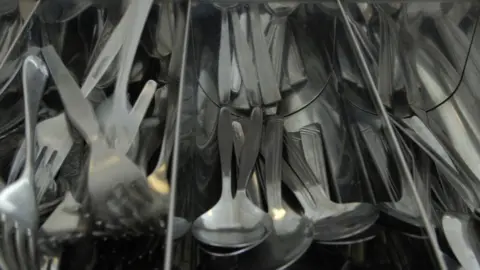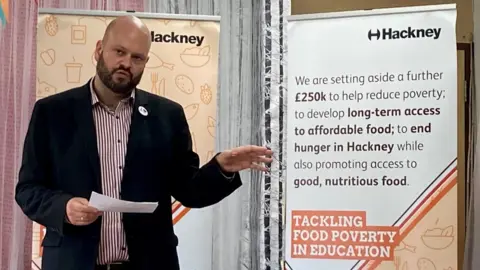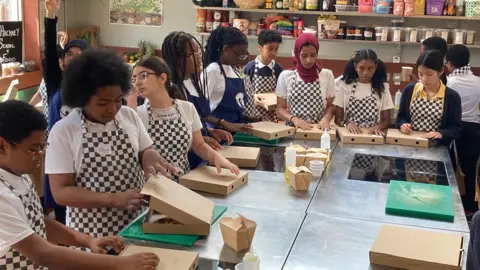London schools pick up free meals funding shortfall
 PA Media
PA MediaSchools and councils are having to find money from their own budgets to implement the mayor of London's pledge to provide free school meals to all primary school pupils from September.
Sadiq Khan has promised £135m to extend free meals for a year.
But schools are worried it could lead to the loss of pupil premium funding and it does not cover the full costs.
Mr Khan said he recently made more money available and was working to ensure pupil premium income went up.
At the moment the government pays for free school meals for all four to six-year-olds at Key Stage 1 and the eligible seven to 11-year-olds at Key Stage 2.
London's mayor said that extending it to another 270,000 seven to 11-year-olds will save families £440 at a time of cost-of-living pressures.
Practical difficulties
But his fund does not cover capital costs so schools cannot access money for new equipment, kitchen improvements or extra staff.
Schools are being given £2.65 per meal, but some are in catering contracts where they are being charged more than that — so will have to make up the shortfall for every new pupil signing up.
The mayor's use of Greater London Authority reserves for a one-year handout is a signature policy ahead of next year's mayoral election.
But it has run up against practical difficulties.
Councils funding kitchen improvements
Labour-run Lewisham Council stepped in with £650,000 for items including new ovens, fridges and other kitchen improvements.
But it said it could not meet the estimated shortfall between what schools were charging and what they were getting from the mayor.
Lewisham's cabinet member for finance Amanda De Ryk said: "It's a brilliant scheme in principle. In practice there are some costs that have come down to the local authority.
"We have had to put a significant amount of money into improving schools' kitchens. But it's the right thing to do."

Dr Increase Eko, head teacher of Adamsrill Primary School in south-east London, said it was important for all children to have at least one hot meal a day but there were questions about the scheme.
"It's good in theory but has a lot of challenges," Dr Eko said. "Schools are struggling with their funding.
"I and other head teachers weren't asked whether it was what we needed at this time."
Her school has a recently modernised kitchen but she needs more storage space, fridges, plates and cutlery.
"We are only just managing to cope," she said. "I can't imagine what older Victorian schools are dealing with."
Pupil premium funding
The biggest concern is the effect on pupil premium funding which is determined by how many disadvantaged children they teach.
They fear if eligible families now get free school meals automatically, they won't register or "apply" for them, thereby reducing the money schools get.
Adamsrill Primary School receives nearly £200,000 a year from the pupil premium.
"If parents don't apply because they think their child now has free school meals, the school isn't going to get a significant amount of money," said Dr Eko.
 Tim Donovan/BBC
Tim Donovan/BBCHackney's Labour mayor Phillip Glanville said he welcomed the money from City Hall as a "game-changer in the national political debate" but it was for one year only and there would be uncertainty after that.
In Hackney at least seven primary schools out of more than 30 currently charge more than £2.65 per meal.
Mr Glanville said the council would meet any shortfall this year but it could not afford to take over the £2.8m overall cost when the City Hall funding ends.
"There's a lot of pressure on our school budgets," he said. "We have a huge SEND (special educational needs and disability) deficit. We are seeing a fall in pupil numbers. Finding that money from our budgets is incredibly hard."
This week Hackney launched "Tackling Food Poverty in Education", a report recommending universal free school meals of high quality, which use more nutritious ingredients locally sourced and delivered in house where possible, rather than being supplied by big catering contractors.
 Tim Donovan/BBC
Tim Donovan/BBCHackney School of Food
Mandeville Primary School in Clapton converted an outbuilding into the Hackney School of Food which other schools hire for cooking classes.
With the income raised, Mandeville is already providing free lunches to all its KS1 and KS2 pupils and with the money from the mayor can now extend it to all infants.
Brad Pearce from the Local Authority Catering Association which represents school caterers, welcomed the mayor's initiative.
Mr Khan said he had been consulting closely with five boroughs — Islington, Newham, Southwark, Tower Hamlets, Westminster — that were already providing universal free school meals.
"The conversations we've had with these councils reassure me that by working with schools and councils and parents and carers we'll make sure all parents fill in the right forms so the schools may actually see an uplift from the pupil premium," Mr Khan said.
"I originally announced £130m. I have increased that to £135m because we have been doing a lot of work with schools and we've undertaken an equality assessment with particular faith communities to make sure there's enough money in the kitty so that every child in primary school, for the first time ever, will have a free school meal."

Follow BBC London on Facebook, Twitter and Instagram. Send your story ideas to [email protected]
